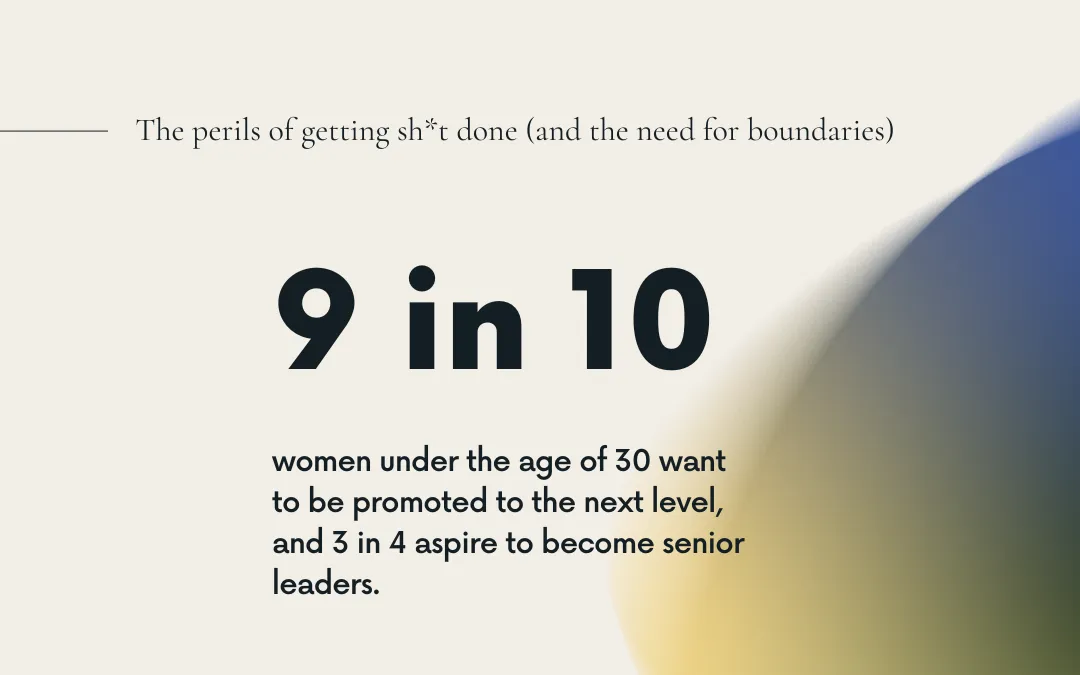The Perils of Getting Sh*t Done
When reliability becomes a trap
.png)
“The very trait that makes people indispensable in their current role can also hold them back and push them toward exhaustion.”
Who wouldn’t want to be good at getting stuff done?
Being reliable, being productive, and welcoming responsibility are all well-regarded qualities. If you’re trusted as a safe pair of hands, you’re more likely to progress into management roles.
But is there a price to pay for this effectiveness?
As Head Coach at Famn, I’ve run group coaching programmes for high-potential women over several years, and for many hundreds of participants. In every cohort, a significant percentage recognise themselves as having a high capacity for “getting sh*t done.”
The shadow side of high productivity and efficiency
These women often describe how these characteristics serve them well. And of course they do: reliability, efficiency, and capacity are all prized in workplaces that need things delivered.
But every trait carries both a strength and a shadow. And in the case of women who are good at getting sh*t done, the shadow side can be constraining – and at times, even harmful.
In my experience, it tends to show up in two main ways:
- As a limitation on career progression.
- As the toll of overwork, overwhelm, and eventually, burnout.
When getting sh*t done limits progression
Having someone on a team with high standards and a huge capacity for work is a gift. Give them a task or a project and it’s delivered without fuss or complaint. Fantastic.
And yet, so often, these people never progress as far as their talent deserves. Many – mostly women – find themselves stuck in middle management, doing great work but not moving further.
Why? Because being uncomplaining, undemanding, and avoiding anything that looks like “diva” behaviour also carries a risk: it makes them indispensable where they are, but invisible when it comes to moving up.
Research backs this up. McKinsey’s 2023 Women in the Workplace report highlights exactly this trap: being reliable makes you invaluable in your current role, but paradoxically less likely to be promoted.

When getting sh*t done becomes unsustainable
“If they are working late, they feel guilty that they’re not at home with the kids or their partner. But when they’re at home, they’re guilty about the work that remains incomplete.”
There’s another danger too: sustainability.
Many women who excel at productivity show what Daniel Goleman, the psychologist of Emotional Intelligence, called a pacesetting style of leadership. The manager is out front, setting the pace, urging the team to keep up. To inspire others to raise their standards, they lead by example – always in motion, always pushing.
It works, but it’s exhausting.
And alongside the exhaustion comes guilt. Several clients have described how, wherever they are, guilt tells them they should be somewhere else. At work, they feel they’re failing their families. At home, they feel they’re failing their teams.
We only feel guilt when we care – which means conscientiousness is a prerequisite for guilt. But when guilt becomes constant, the strengths of conscientiousness begin to collapse in on themselves.
The perilous cycle of never doing enough
When guilt takes hold, it often drives a destructive cycle.
We asked one client what made her anxious. Her answer: not getting everything on her (enormous) to-do list finished. And how did she respond to that stress? By working harder and longer.

The benefits of her enormous capacity for work were clear. But so were the consequences of the unsustainable demands she placed on herself: overwhelm, exhaustion, and creeping burnout.
In other words: the very trait that fuels her success also fuels her undoing.
So if we find ourselves in this cycle – compelled to keep proving our reliability while slowly burning out – how do we break it?
Disrupting the pattern
The starting point is awareness. We cannot disrupt unhelpful patterns without spotting them first.
But awareness alone isn’t enough. These patterns exist for a reason, and often that reason is rooted in childhood. They may once have been protective strategies that kept us safe.
Transactional Analysis, a branch of psychology, calls two of these drivers Try Hard and Be Perfect. They’re powerful motivators. But under pressure, they can trap us in precisely the cycles we most need to escape.
This is why change tends to be incremental. Trying to flip the pattern all at once rarely works. Experimenting with small changes – consciously resisting the urge to say “yes” to everything, for instance – can be far more effective.
Cultivating the ability to say no
“Setting boundaries and saying no is at the heart of developing our resilience.”
This is where boundaries come in. Learning to consciously decide what we take on – and what we don’t – can feel alien at first. For many, saying no feels risky, even catastrophic, as if it might stall their career altogether.
And yet, paradoxically, it often does the opposite. By saying no to overload, we preserve our energy, sustain our contribution, and protect ourselves from burnout.
The opposite is also true. In workplaces – and home lives – where the demands are endless, having little ability to set boundaries is almost a guarantee of eventual exhaustion.
Of course, there are times when all of us need to put in extra effort, to push ourselves to the limit. But those moments are meant to be exceptions, not the default state.
And that’s the point of this piece: if we don’t develop the ability to notice when we’re over-extending, and to set boundaries against it, we lose the very resilience we need to thrive. Worse, we may unintentionally hold ourselves back from the career progression our talent deserves.
SPEAKERS
“The very trait that makes people indispensable in their current role can also hold them back and push them toward exhaustion.”
Who wouldn’t want to be good at getting stuff done?
Being reliable, being productive, and welcoming responsibility are all well-regarded qualities. If you’re trusted as a safe pair of hands, you’re more likely to progress into management roles.
But is there a price to pay for this effectiveness?
As Head Coach at Famn, I’ve run group coaching programmes for high-potential women over several years, and for many hundreds of participants. In every cohort, a significant percentage recognise themselves as having a high capacity for “getting sh*t done.”
The shadow side of high productivity and efficiency
These women often describe how these characteristics serve them well. And of course they do: reliability, efficiency, and capacity are all prized in workplaces that need things delivered.
But every trait carries both a strength and a shadow. And in the case of women who are good at getting sh*t done, the shadow side can be constraining – and at times, even harmful.
In my experience, it tends to show up in two main ways:
- As a limitation on career progression.
- As the toll of overwork, overwhelm, and eventually, burnout.
When getting sh*t done limits progression
Having someone on a team with high standards and a huge capacity for work is a gift. Give them a task or a project and it’s delivered without fuss or complaint. Fantastic.
And yet, so often, these people never progress as far as their talent deserves. Many – mostly women – find themselves stuck in middle management, doing great work but not moving further.
Why? Because being uncomplaining, undemanding, and avoiding anything that looks like “diva” behaviour also carries a risk: it makes them indispensable where they are, but invisible when it comes to moving up.
Research backs this up. McKinsey’s 2023 Women in the Workplace report highlights exactly this trap: being reliable makes you invaluable in your current role, but paradoxically less likely to be promoted.

When getting sh*t done becomes unsustainable
“If they are working late, they feel guilty that they’re not at home with the kids or their partner. But when they’re at home, they’re guilty about the work that remains incomplete.”
There’s another danger too: sustainability.
Many women who excel at productivity show what Daniel Goleman, the psychologist of Emotional Intelligence, called a pacesetting style of leadership. The manager is out front, setting the pace, urging the team to keep up. To inspire others to raise their standards, they lead by example – always in motion, always pushing.
It works, but it’s exhausting.
And alongside the exhaustion comes guilt. Several clients have described how, wherever they are, guilt tells them they should be somewhere else. At work, they feel they’re failing their families. At home, they feel they’re failing their teams.
We only feel guilt when we care – which means conscientiousness is a prerequisite for guilt. But when guilt becomes constant, the strengths of conscientiousness begin to collapse in on themselves.
The perilous cycle of never doing enough
When guilt takes hold, it often drives a destructive cycle.
We asked one client what made her anxious. Her answer: not getting everything on her (enormous) to-do list finished. And how did she respond to that stress? By working harder and longer.

The benefits of her enormous capacity for work were clear. But so were the consequences of the unsustainable demands she placed on herself: overwhelm, exhaustion, and creeping burnout.
In other words: the very trait that fuels her success also fuels her undoing.
So if we find ourselves in this cycle – compelled to keep proving our reliability while slowly burning out – how do we break it?
Disrupting the pattern
The starting point is awareness. We cannot disrupt unhelpful patterns without spotting them first.
But awareness alone isn’t enough. These patterns exist for a reason, and often that reason is rooted in childhood. They may once have been protective strategies that kept us safe.
Transactional Analysis, a branch of psychology, calls two of these drivers Try Hard and Be Perfect. They’re powerful motivators. But under pressure, they can trap us in precisely the cycles we most need to escape.
This is why change tends to be incremental. Trying to flip the pattern all at once rarely works. Experimenting with small changes – consciously resisting the urge to say “yes” to everything, for instance – can be far more effective.
Cultivating the ability to say no
“Setting boundaries and saying no is at the heart of developing our resilience.”
This is where boundaries come in. Learning to consciously decide what we take on – and what we don’t – can feel alien at first. For many, saying no feels risky, even catastrophic, as if it might stall their career altogether.
And yet, paradoxically, it often does the opposite. By saying no to overload, we preserve our energy, sustain our contribution, and protect ourselves from burnout.
The opposite is also true. In workplaces – and home lives – where the demands are endless, having little ability to set boundaries is almost a guarantee of eventual exhaustion.
Of course, there are times when all of us need to put in extra effort, to push ourselves to the limit. But those moments are meant to be exceptions, not the default state.
And that’s the point of this piece: if we don’t develop the ability to notice when we’re over-extending, and to set boundaries against it, we lose the very resilience we need to thrive. Worse, we may unintentionally hold ourselves back from the career progression our talent deserves.


.png)

.png)